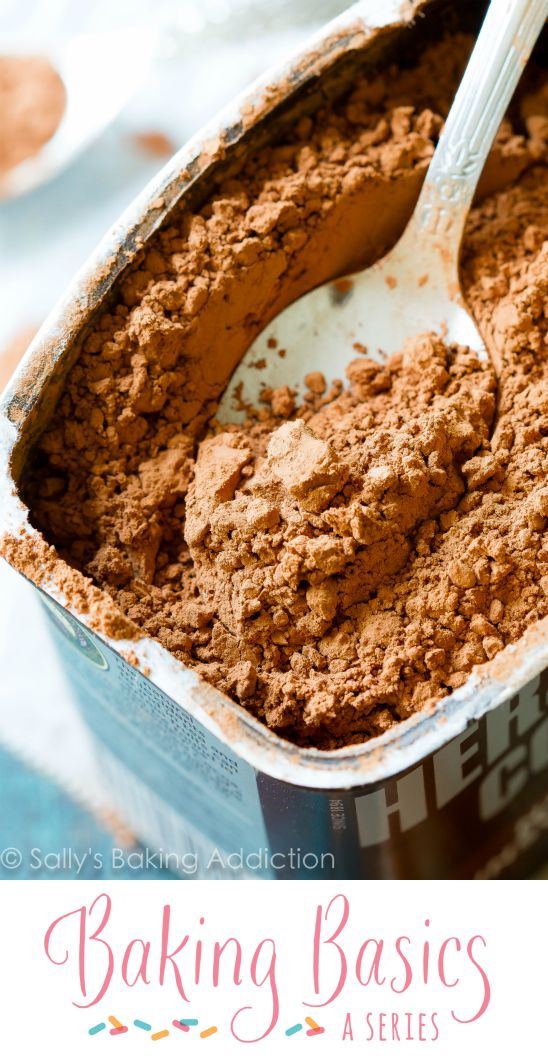
Welcome back to my beloved baking basics series where I blab about nerdy baking things. If you’re a curious baker like I am, grab a cup of coffee with me and stick around! Especially if you like chocolate.
Today I’m demystifying the difference between dutch-process and natural cocoa powder. Like the baking powder vs. baking soda head-scratcher, the difference between these two types of unsweetened cocoa powders is beyond confusing. When I first began, most explanations I saw on the internet left me even more puzzled than when I started reading. So, let me break things down for you in regular terms.
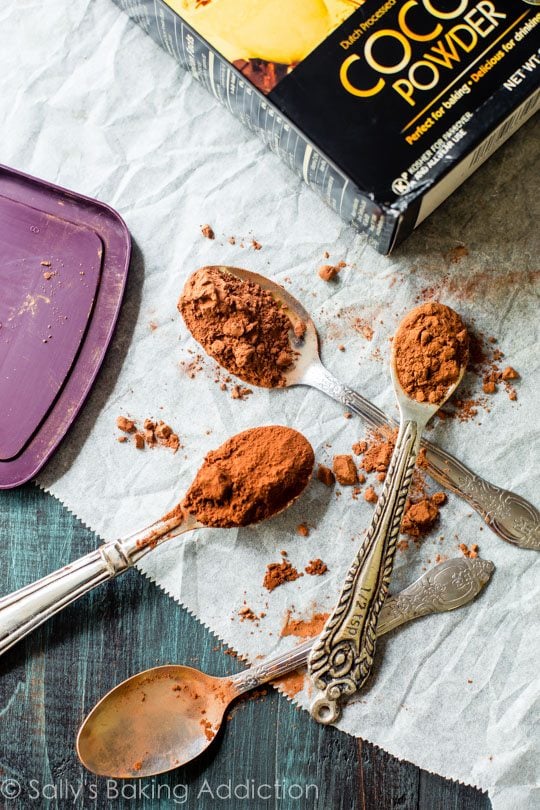
There are two types of unsweetened cocoa powder: dutch-processed and natural. The two have different chemical properties and, therefore, different little jobs in a recipe.
First, let’s find out what cocoa powder actually is.
What Is Cocoa Powder?
I’m glad you asked! Cocoa powder comes from cocoa beans. Crazy, isn’t it. The beans are fermented, dried, roasted and cracked into nibs. Then, the nibs are pressed to remove 75% of their cocoa butter. This leaves us with chocolate liquor. The pasty liquor is dried and then ground into unsweetened cocoa powder. All done!
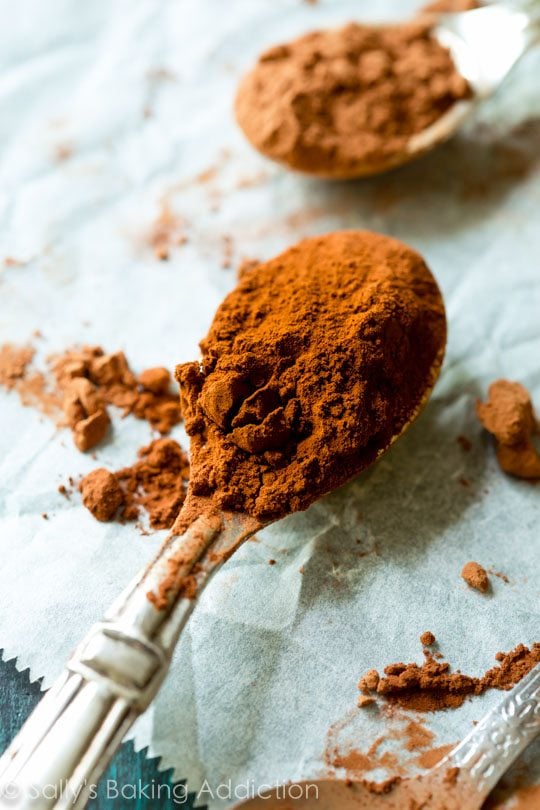
Before you read the differences between dutch-process and natural cocoa powder, I encourage you to read my informational post about baking soda vs. baking powder. Understanding the difference between these two will greatly help you make sense of dutch-process vs natural cocoa powder.
Let’s break down each.
Dutch-Process Cocoa Powder (Alkalized Cocoa)
Dutch-process cocoa powder starts with cocoa beans that have been washed in alkaline solution of potassium carbonate. This wash neutralizes their acidity. So, dutch-process cocoa powder is neutral. Because it is neutral, it does not react with baking soda. It’s often paired with baking powder. (But not always!)
Hooray, SCIENCE!
Alkalizing cocoa makes it darker in color, mellow in flavor, and dissolves easily into liquids. Homemade Oreo cookies are made from dutched cocoa! Yum.
Natural Cocoa Powder
Natural cocoa is just that—natural powder from roasted cocoa beans. It’s acidic and bitter, with a very strong and concentrated chocolate flavor. Natural cocoa powder (ACID) is often used in recipes calling for baking soda (BASE) because the two react with each other to allow your baked good to rise. If you live in the US, the cocoa powder you often see in the baking aisle is natural—like Hershey’s (not the Special Dark, the regular) or Ghirardelli. Flavor varies by brand, but you can always find me using either of these two.
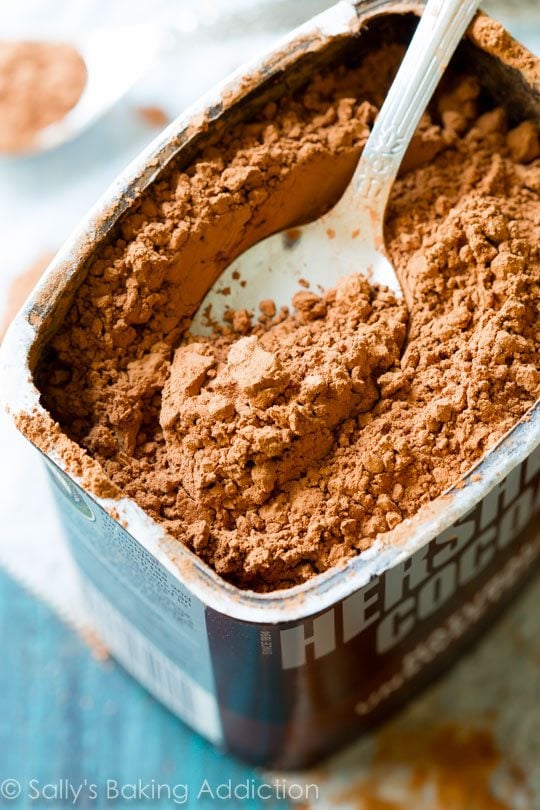
Which Type of Cocoa Should I Use?
You can use either type in recipes that do not call for baking soda or baking powder. Such as sauces, hot cocoa, brownies (as long as there is not BP or BS!), frostings, ice cream, pudding, etc. There is no leavening occurring, so it doesn’t matter. You can go by your taste preference.
Recipes requiring leavening are different. And, you guessed it, a little more complicated. Because it’s chemistry! Since cocoa powder can be acidic (natural) or neutral (dutched), always stick with the type of cocoa called for in that recipe. Using the wrong cocoa can result in a flat cake, bitter soapy flavor, sunken cupcakes, etc. If you’re in a bind, you can use natural cocoa powder for dutch-process. But do not use dutch-process for natural! The recipe likely needs that acid.
But what if a recipe doesn’t specify?
Older American recipes for chocolate cake, breads, cookies, or cupcakes are usually leavened with baking soda, but simply say “cocoa powder” without specifying which type. Use natural cocoa powder. I suggest this because natural cocoa powder is usually used for batters containing baking soda and dutch-process cocoa powder is usually used for batters containing baking powder.
Raw Cocoa Powder
Raw cacao powder is different from natural and dutch-process unsweetened cocoa powder. Raw cacao powder is pure powder from the cacao bean and much less processed than both natural and dutch-process. You can use raw cacao powder in recipes calling for natural cocoa powder, but the two taste different. Keep that in mind when using it in your recipes.
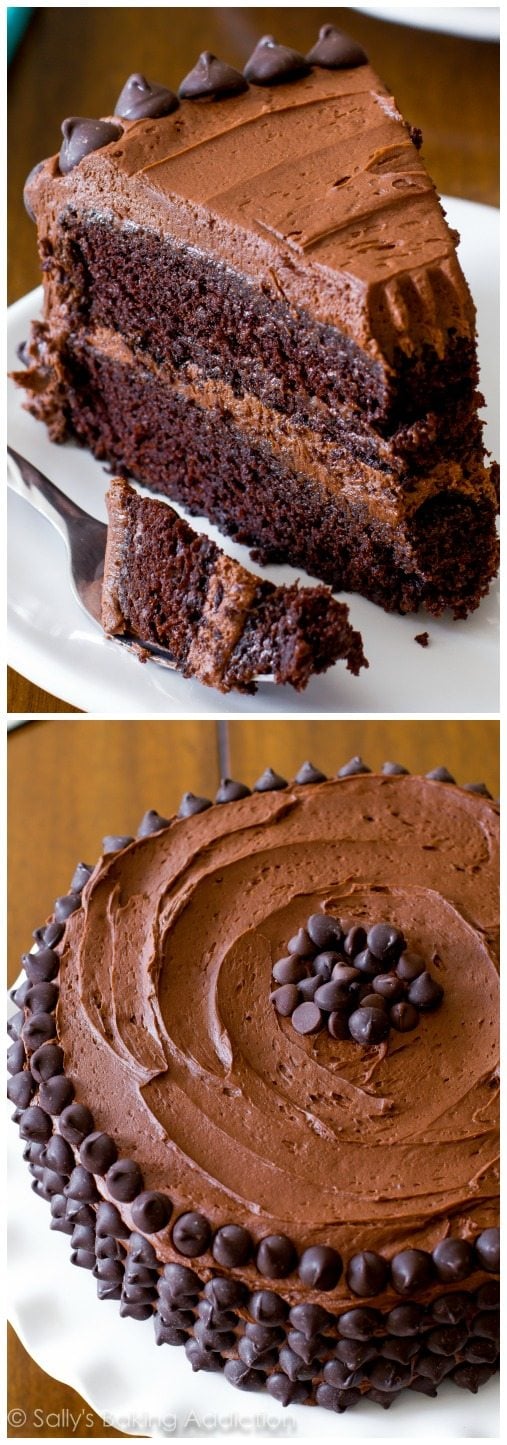
That’s all for now! Do you sort of understand now? Or did I completely bore you?
Further reading:
Until next time!


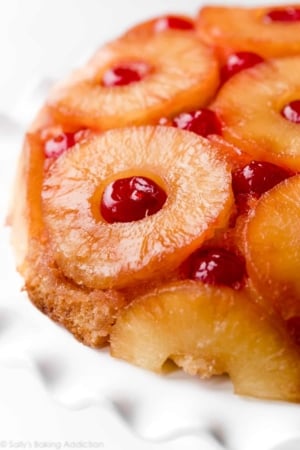










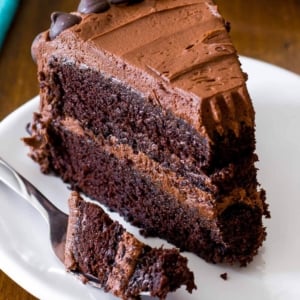

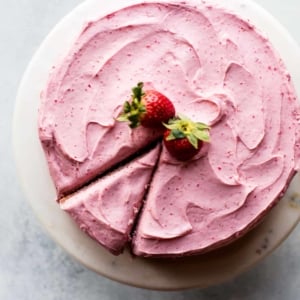


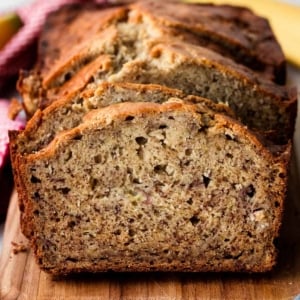
So what is the exact difference between cocoa and cacao? 🙂
Dutch-process vs. “natural” is fairly straightforrward. Dutched is synonymous to “processed with alkali” – and you will find that designation as well in some ingredient lists. Same thing.
But many texts use cacao and cocoa interchangeably or give explanations that makes sense.
Usually something like “cacao is the raw, natural form” and the “cocoa is processed”. Uhmm… this makes no sense because they are all processed, otherwise we’d be nibbling on nibs…
I am guessing fermentation, drying and grinding are common to both cacao and cocoa. Which parts of the processing is missing in cacao vs. cocoa?
Also, most “memes” comparing cocoa to cacao seem to refer to the kind of instant cocoa powders which are mixtures of cacao, hydrogenated oils, emulsifiers, presevatives and other flavorants. These are not the same as the two types of cacao powders you discuss here.
Hi Dan, Raw cacao powder is pure powder from the cacao bean and much less processed than both natural and dutch-process.
Hi Sally! Thank you for this article – I am planning to make the 6 inch chocolate cake recipe on your website for my daughter’s birthday. I purchased some black cocoa powder from a local store and I was planning to use that in the recipe – I tested it out in an Ice cream recipe to get a taste of the flavor profile and it was very rich (which I like) but I am wondering if I can swap it into the cake recipe as well? If I am understanding everything I’ve read online, black cocoa powder = ultra alkalized? Thanks again!
Hi Devon! We’re happy to help. Because the chocolate cake calls for baking soda, it’s best to use natural unsweetened cocoa powder. Black cocoa powder tends to be Dutch processed and wouldn’t be the best for the cake. You could, however, use it in a recipe like these brownies since there isn’t baking soda or baking powder present. Hope this helps!
Hi Sally! I love your recipes and have had much success with them. I have a question about red Dutch processed cocoa powder. I bought a tin of Guittard’s cocoa rouge but have been afraid to try it! I wasn’t sure if the flavor was any different. Have you ever used it? After reading your explanation of the differences in cocoa powders, I’m tempted to try it in my chocolate buttercream frosting for the triple chocolate cake. I’d love to know your thoughts.
Hi Jennie, We actually have not tested it. If you wish to test it out, frosting would be a great place to give it a try. Let us know how it turns out!
What is the best cocoa powder to use for chocolate milk, especially hot cocoa? Is it more a personal preference for drinks, since it is not being baked, or leavened? Have you tried using both for hot cocoa and have a preference of one over the other? Any taste difference?
Hi Kay! We use natural unsweetened in hot cocoa usually, but you can use dutch-process if you prefer the falvor. There’s no baking involved, so it’s an easy switch – either works!
Your blog sounds fascinating. How do I get it in my email?
(Your desserts are very good too! )
Hi Jeannette, you can sign up here!
Great article. So considering there is no leavening other than eggs, why does my flourless chocolate cake call for Dutch process cocoa? Thanks!
Hi Brenda, some may prefer one flavor over the other. Our flourless chocolate cake calls for either, since, you’re right – no learners to worry about.
I am using a recipe that has both baking powder and baking soda in it. The cocoa powder type isn’t specified. I assume that either one will work in this case.
Hi Sandra, usually if it’s not specified, the recipe calls for natural cocoa powder. If it’s one of our recipes, let us know which one and we can better answer!
Part 2…update.
I did have to fill the cups 2/3 to get the height you have on your recipe, using my Dutch Chocolate (ph 8.5). Therefore, I am losing some yield. Would it help if I increased the Baking powder from 3/4 tsp to 1 tsp?. I do like the moist , cakey texture. Not expecting fluffy.
hI, I made this recipe before reading about Dutch vs. Natural. I had already invested in a large can of Ghirardelli Majestic and would probably not have tried the recipe. I did not have an issue with them not rising. I did not more research and the product is not totally neutral. It has a ph of 8.5.
Since your recipe has brown sugar and buttermilk which are acids, was that enough to interact with the Dutch-processed alkaline (BASE) and Baking Soda (BASE) which made it rise?
It is a little dense. If I increase an ACID such as the brown sugar (less white) or Baking Soda to interact with the Chocolate (BASE), will that make it little more fluffy? I don’t want to waste the Ghirardelli I purchased. They taste really good.
Hi Allison, If you let us know which exact recipe you were making, then we can try to help!
Sally, you are NEVER boring! Thanks for the article!
Hi, Love your article.
2 questions if you’re still checking
1. In frosting, is Dutch cocoa powder just more rich than regular? (The Dutch cocoa frosting I made is so rich)
2. Why does Hershey’s cocoa powder taste funny, especially in things like hot cocoa? Is it the brand or am I using it incorrectly?
Wow, you are so helpful. Very informative. Never thought about this. Now I must look at recipes and what they ask for! It makes so much sense.. Thank you so so much. I just always thought Dutch process would make a more deep, darker choc cake than natural? So we should always keep both on hand.. I’m glad I came across you. Can’t wait to try your baked goods!!
What about recipes that call for both baking soda and baking powder. Does it matter which one is used?
Hi Channel! Here’s our post on the differences between baking soda and baking powder – hope it’s helpful!
Is Hershey’s “Special Dark” also natural? This is the kind I mostly use. What brands are Dutch process?
Thanks!
Hi Sharon, Hershey’s Special Dark Cocoa is a Dutched cocoa. The containers will typically indicate if the cocoa is natural or Dutched. Hope this is helpful!
The presence of baking soda (at all) suggests that some acid (natural cocoa) is needed, if I read the article correctly, and if the recipe doesn’t specify. However, since baking powder provides enough acid for itself, I’m guessing it’s fine to use whichever you have on the shelf or whichever is easiest to get. Personally I’ve found recipes that use both baking soda and baking powder to be pretty forgiving in terms of rise.
I made the NYT olive oil chocolate cake yesterday. Recipe calls for Dutch process cocoa and baking powder. I only had natural chocolate powder. In that case should I have eliminated the BP? It turned out fine, but not a deep chocolate flavor. The rise was perfect.
The nytimes chocolate olive oil cake I made called for Dutch processed cocoa and baking soda. Which completely threw me after reading this article… though it does say not always… I used natural powder and the soda and it rose fine. How did yours turn out?